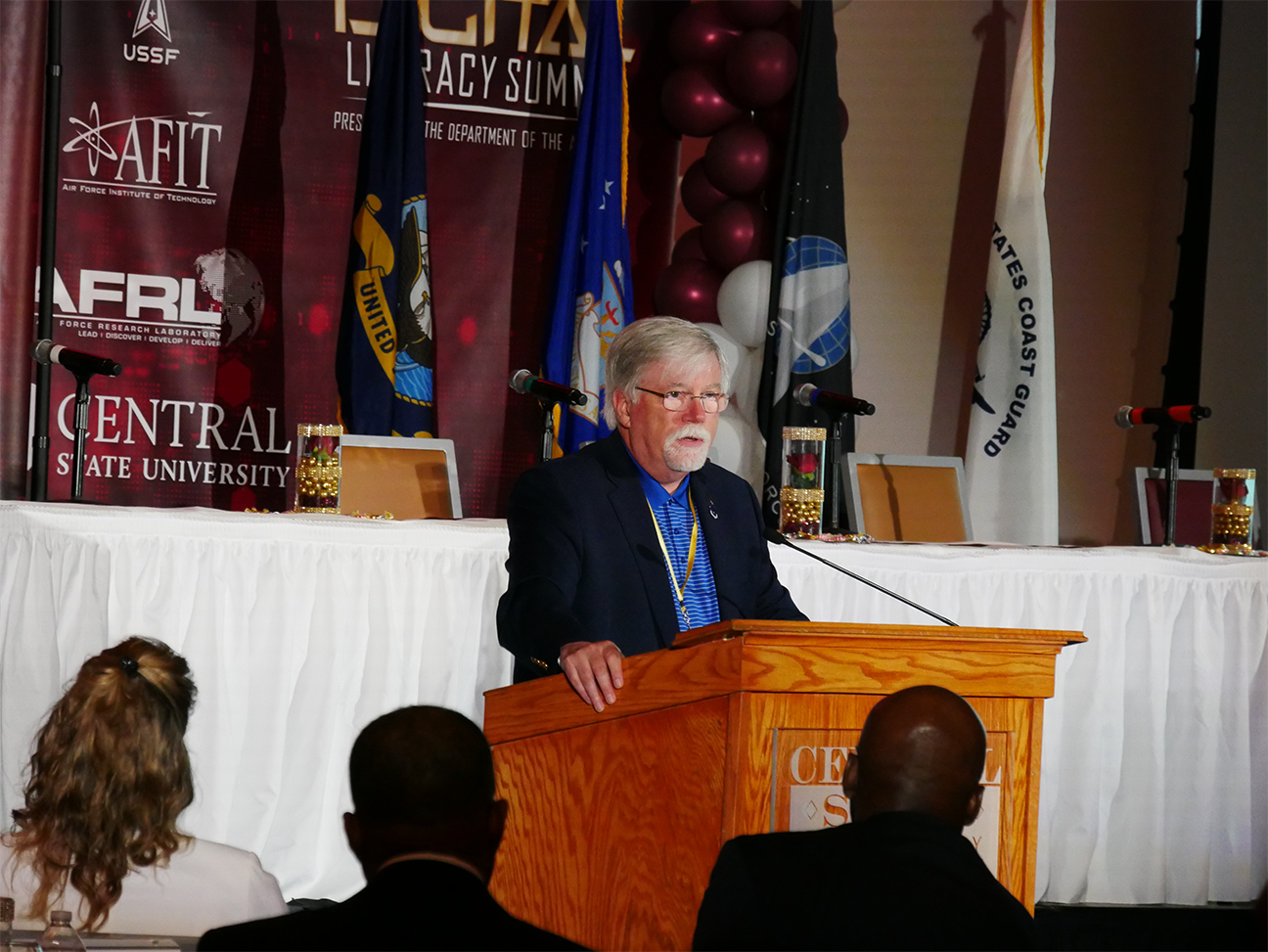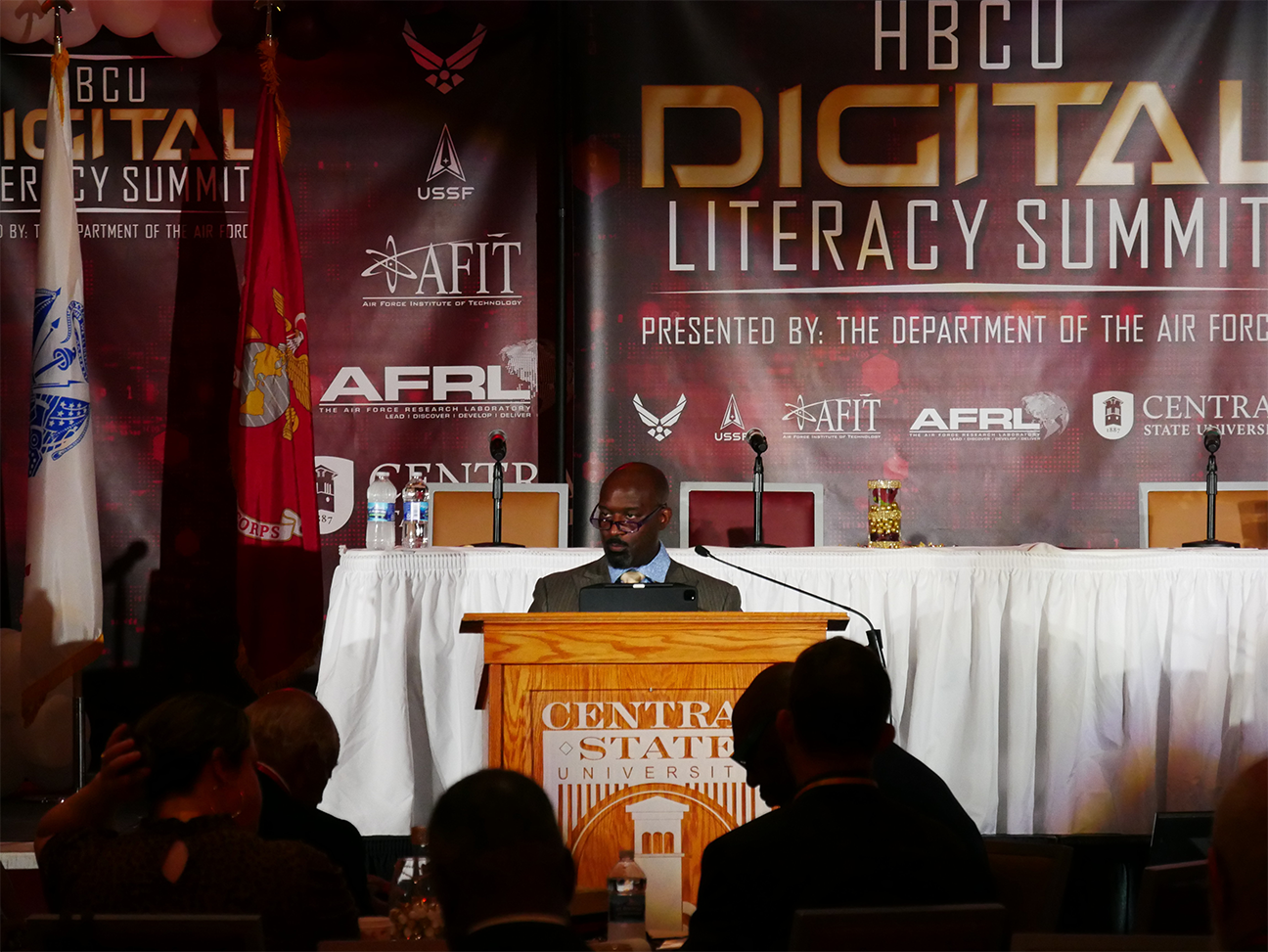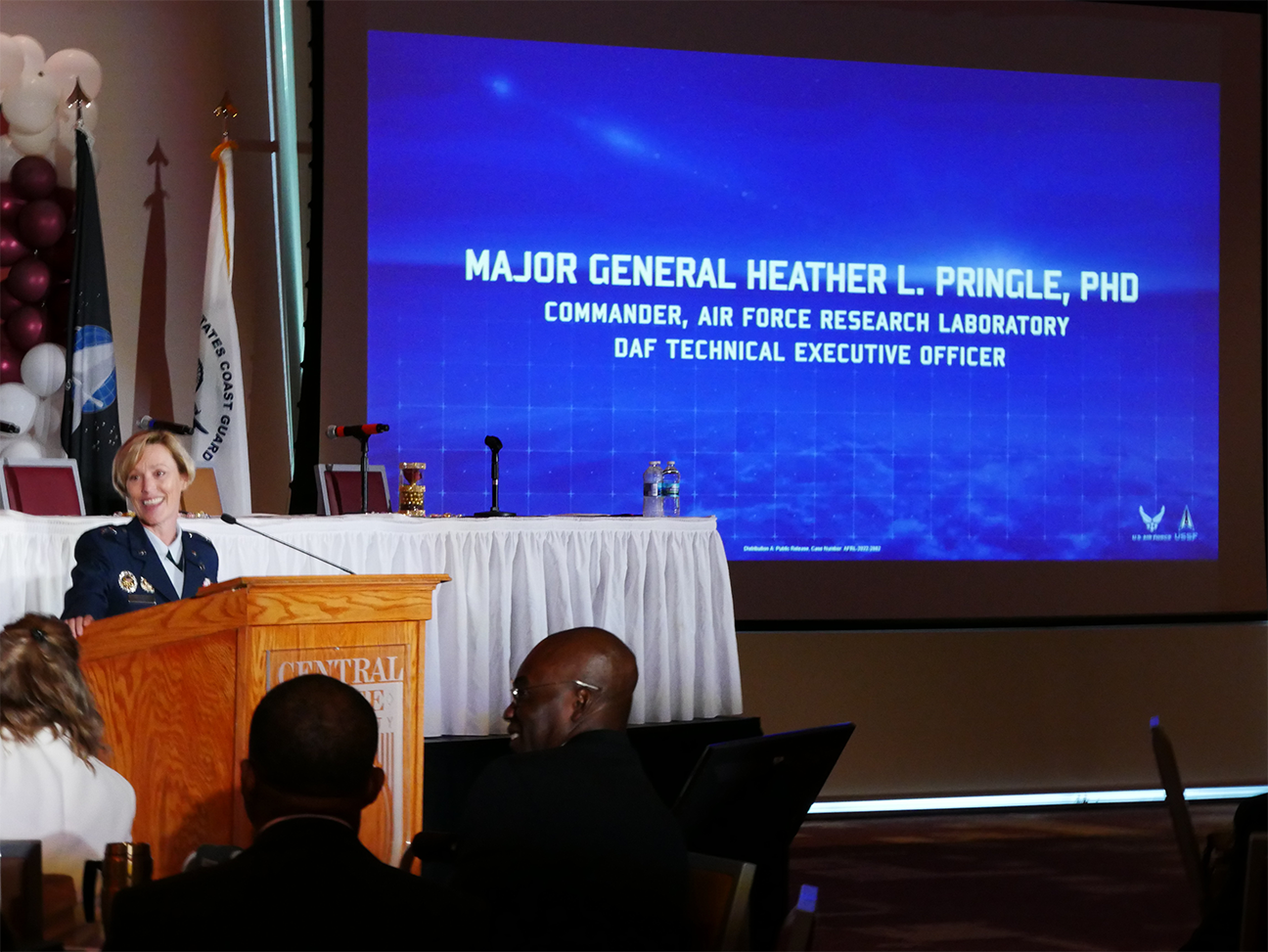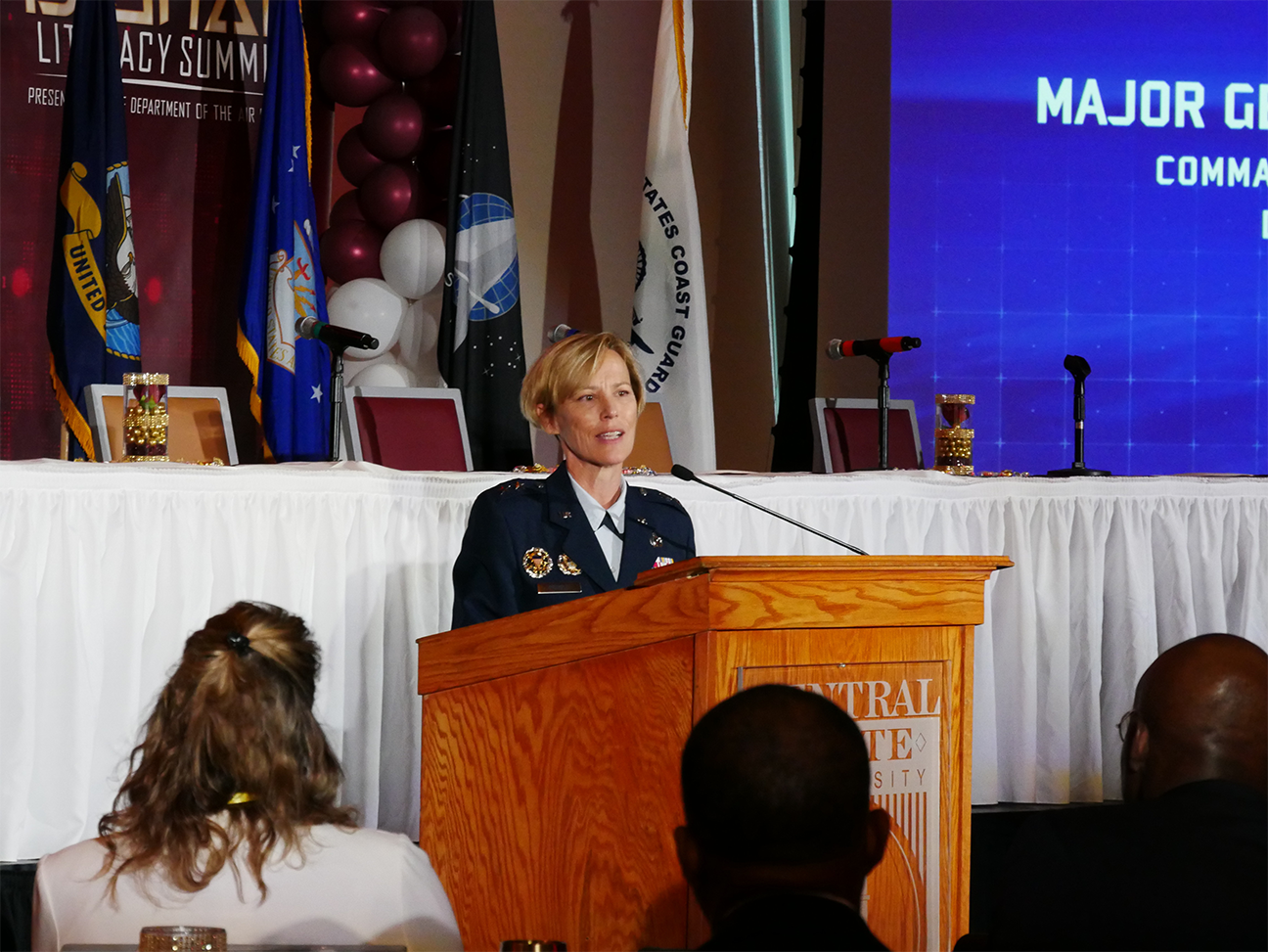Digital Literacy Summit brings together HBCUs, DAF science, technology communities
WRIGHT-PATTERSON AIR FORCE BASE, Ohio (AFRL) — An Historically Black Colleges and Universities, or HBCU, Digital Literacy Summit, presented by the Department of the Air Force, was broadcast from Central State University in Wilberforce, Ohio, June 21-22, 2022.
The summit served to bring HBCUs and DAF Science and Technology communities from the Air Force Research Laboratory and Air Force Institute of Technology together to establish channels that will strengthen collaborative agreements and research efforts in digital engineering, digital acquisitions, and big data research to address DAF challenges.
The event featured many speakers including Maj. Gen. Heather L. Pringle, commander, AFRL and technology executive officer, supporting both the U.S. Air Force and U.S. Space Force; Dr. Victoria Coleman, chief scientist of the U.S. Air Force in Arlington, Virginia; Dr. Michael Hayduk, deputy director, AFRL Information Directorate, Rome, New York; retired Gen. Lester Lyles, former vice chief of staff of the U.S. Air Force and commander of Air Force Materiel Command; and Dr. Shery L. Welsh, member of the senior executive service, director of the Air Force Office of Scientific Research, or AFOSR, in Arlington, Virginia. AFOSR is a directorate within AFRL. Dr. Reginald Turner, associate dean of the Air Force Institute of Technology’s School of Systems and Logistics, hosted the event.
“This is a concerted effort by the DOD to enable HBCUs to become equal partners in solving our nation’s most critical challenges,” Turner said. “One key outcome of this summit is to form a task force that will deliver a plan that can be implemented to realize the seamless collaboration sought between the DAF and the HBCU Community,” he added.
The summit advances the Historically Black Colleges and Universities propelling agency relationships toward a new era of results for students, or PARTNERS, Act, a White House initiative aimed at addressing systemic inequities within HBCUs. The act aims to align the educational end economic competitiveness priorities; provide students enrolled at HBCUs with the highest quality educational and economic opportunities; bolster and facilitate productive interactions between HBCUs and federal agencies; and to encourage HBCU participation in and benefit from federal programs, grants, contracts and cooperative agreements.
Digital literacy
Pringle explained HBCUs have a greater role to play and said “AFRL definitely wants to be a part of that. But on the technology side as well.”
When it comes to the digital world, Pringle said digital literacy and digital capabilities make it possible and “enable us to share information on a scale and at a speed that has been unimaginable in the past.”
With four goals in mind to take AFRL to the next level with digital literacy, Pringle said it has taken much effort to change the culture within the lab in order to take advantage of new tools available.
The four goals for the digital transformation approach are to conduct faster research, make better decisions, streamline transitions and facilitate low friction business operations.
“I’m really excited about this digital transformation because we’re already seeing the fruits of this labor,” Pringle added. “So if we’re ultimately successful, this is the future that we hope to build with our digital transformation.”
If successful with the digital transformation goals, Pringle said it’s a future where the community can envision machines interoperating with each other, which “leave[s] the humans doing what they do best, and that’s making trustworthy decisions for our warfighting capabilities and letting the machines do what they do best, handling large volumes of data and processing things at faster speeds than what a human can do.”
However, none of the technology would be possible without the people, Pringle said.
“So the last point that I want to make is that we have room to grow at the research lab,” Pringle said. “We’re really proud of the recognition that just recently came out by the U.S. Black Engineer online magazine, and it named AFRL as number nine of 20 institutions that are friendly for HBCUs.”
Pringle said she would like to see AFRL as No. 1 on that list in order to “achieve a greater level of research, collaboration and generate some really new exciting ideas that haven’t been haven’t been addressed in the past.”
Autonomy
Coleman discussed autonomy and trusting it by learning what works and what doesn’t.
“We start thinking a little bit about what it actually takes to deploy autonomy,” she said. “Once you trust an autonomous function, then you know the thing and you start thinking about how you’re going to deploy it.”
Coleman reiterated that trust is really what makes autonomy so challenging.
“Really, trust is all about controlling uncertainty,” she added.
And when creating an environment for testing the autonomous system, the system itself as well as the environment becomes a new set of uncertainties.
“The uncertainty now comes from two places,” Coleman added. “It certainly comes from the operating environment, but it comes from the system itself, right so the very nature of an autonomous system implies uncertainty as to its function.”
Coleman compared the way autonomous systems work to human teams.
“And some, as we all know…[some teams] work better than others,” she said.
Coleman explained that the absence of trust can cause a team to dysfunction and lead to bad outcomes. However, practicing and being a role model can create trust, which Coleman said is the same way humans can work with synthetic “buddies.”
But much practice and training must take place before autonomous systems are put in place.
“The other piece is…how that then gets translated into capabilities that a squadron can execute,” Coleman said. “If our adversaries are smarter than we are in transforming their departments of the Air Force to fight the next war with autonomy and we don’t, then we’ll be at a significant disadvantage.”
Air Force Office of Scientific Research
Digital literacy is an important topic not only for HBCUs, but for the nation, said Welsh.
“Some have even said that it’s the most important lifelong learning tool because it permeates pretty much most of what we do on a daily basis, which is very true,” Welsh added.
AFOSR invests in capacity-building programs as well as developing strategic partnerships across the globe.
“[AFOSR is a] very small organization with a really big mission,” Welsh said. “Our mission essentially is to discover shape and champion basic research across the globe that brings profound impacts to the Air Force and Space Force, one lab serving supporting two services as part of the Air Force Research Lab.”
With employees all across the U.S. and five international offices, the AFRL understands digital literacy as a matter of national security.
“AFOSR is committed to the creation of that extended network of diverse students, professors and general STEM educated citizens,” Welsh added. “At any given time we have, just in the U.S. alone, about 1,400 practical projects going on and the universities. We’re in 43 countries outside of the U.S. as well investing in research. So we truly have a very large global footprint, and our linkages are huge with academia.”
With the large global footprint, Welsh said it is imperative to have diversity.
“Diversity is the word of the day,” she said. “Creating those partnering arrangements and varied institution types. We’re really encouraged into interdisciplinary collaboration and strive for maximum discovery potential for the future Air Force and Space Force.
AFOSR continues looking toward the future as they continue reaching out to HBCUs to be part of the DAF Science and Technology system.
“And we absolutely want HBCUs to be part of our future,” Welsh added.
Diversity of thought is what is needed to solve the problems for the Air Force Space Force in the future, Welsh said.
“And you are the ones who are providing the source for a diverse U.S. citizen-scientists and engineers for us to reach into, HBCUs are a priority for the Department of the Air Force,” she added. “So I hope you understand that you and your institutions are vitally important for the future of national defense.”
AFRL is always looking for new ways to find smart, motivated, dedicated scientists and engineers who have innovative ideas and solutions, she added. And forging partnerships with the deans of research with university business offices, principal investigators, future graduates and the like, will help in this endeavor.
“The AFOSR is committed to the creation of this extended network of diverse students, professors in general some educated citizens that are aware of the Department of Defense requirements in the science and technology communities,” Welsh said.
About AFRL
The Air Force Research Laboratory (AFRL) is the primary scientific research and development center for the Department of the Air Force. AFRL plays an integral role in leading the discovery, development, and integration of affordable warfighting technologies for our air, space, and cyberspace force. With a workforce of more than 11,500 across nine technology areas and 40 other operations across the globe, AFRL provides a diverse portfolio of science and technology ranging from fundamental to advanced research and technology development. For more information, visit: www.afresearchlab.com.
About AFOSR
The Air Force Office of Scientific Research (AFOSR) expands the horizon of scientific knowledge through its leadership and management of the Department of the Air Force’s basic research program. As a vital component of the Air Force Research Laboratory (AFRL), AFOSR’s mission is discover, shape and champion basic research that profoundly impacts the future Air and Space Forces. AFOSR accomplishes its mission through global investment in advanced discovery research efforts in relevant scientific areas. Central to AFOSR’s strategy is the transfer of the fruits of basic research to industry, the supplier of Air Force acquisitions; to the academic community, which can lead the way to still more accomplishment; and to the other directorates of AFRL that carry the responsibility for applied research leading to acquisition.
About AFIT
The Air Force Institute of Technology, with its main campus located at Wright-Patterson Air Force Base, Ohio, is the Air Force’s leader for advanced, multi-disciplinary academic education, as well as its institution for technical professionals continuing education. AFIT is committed to providing innovative, defense-focused graduate education and related research, and operationally relevant professional continuing education to sustain the technological supremacy of America’s air, space, and cyber forces. Since 2008, AFIT has been designated as the Air Force’s Cyber Technical Center of Excellence.

Dr. Walter Jones, Air Force Institute of Technology’s director and chancellor, speaks during the Historically Black Colleges and Universities, or HBCU, Digital Literacy Summit June 21, 2022, at Central State University, Wilberforce, Ohio. The event, sponsored by the Department of the Air Force, Air Force Research Laboratory, AFIT and Central State University united the HBCUs and DAF Science and Technology communities to address current challenges, strengthen collaborative agreements and promote research efforts. (U.S. Air Force photo / Kenneth McNulty)

Dr. Reginald Turner, associate dean of the Air Force Institute of Technology’s School of Systems and Logistics, speaks during the Historically Black Colleges and Universities, or HBCU, Digital Literacy Summit June 21, 2022, at Central State University, Wilberforce, Ohio. The event, sponsored by the Department of the Air Force, Air Force Research Laboratory, AFIT and Central State University united the HBCUs and DAF Science and Technology communities to address current challenges, strengthen collaborative agreements and promote research efforts. (U.S. Air Force photo / Kenneth McNulty)

Maj. Gen. Heather L. Pringle, Air Force Research Laboratory commander, speaks during the Historically Black Colleges and Universities, or HBCU, Digital Literacy Summit June 21, 2022, at Central State University, Wilberforce, Ohio. The event, sponsored by the Department of the Air Force, AFRL, Air Force Institute of Technology and Central State University united the HBCUs and DAF Science and Technology communities to address current challenges, strengthen collaborative agreements and promote research efforts. (U.S. Air Force photo / Kenneth McNulty)

Maj. Gen. Heather L. Pringle, Air Force Research Laboratory commander, speaks during the Historically Black Colleges and Universities, or HBCU, Digital Literacy Summit June 21, 2022, at Central State University, Wilberforce, Ohio. The event, sponsored by the Department of the Air Force, AFRL, Air Force Institute of Technology and Central State University united the HBCUs and DAF Science and Technology communities to address current challenges, strengthen collaborative agreements and promote research efforts. (U.S. Air Force photo / Kenneth McNulty)
